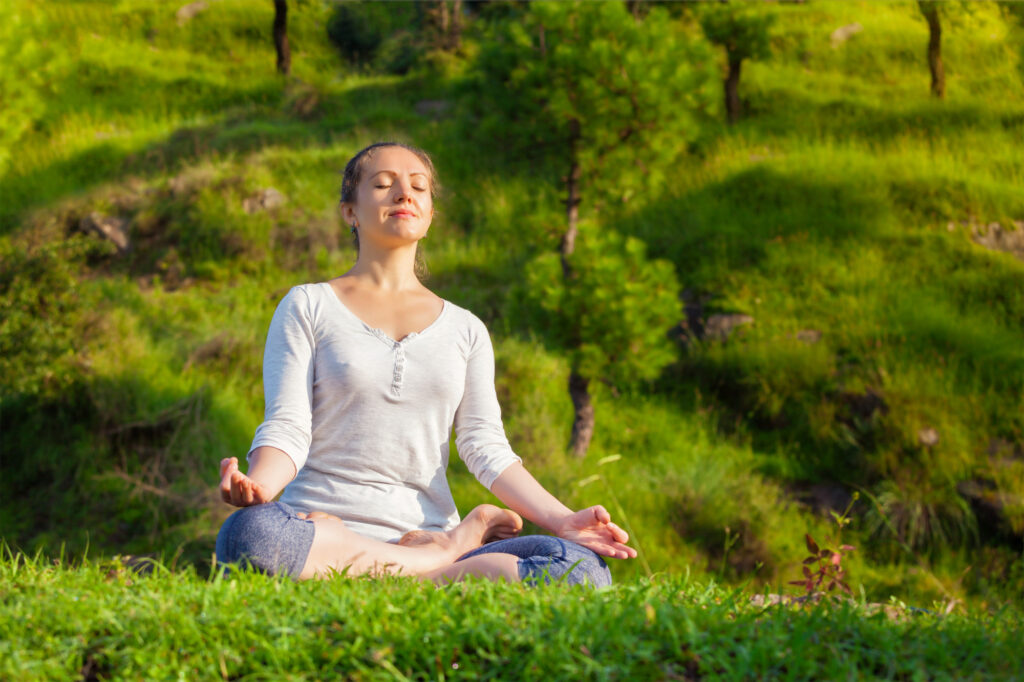- Finding Calm

In recent years, both meditation and mindfulness have gained widespread popularity as effective ways to manage stress and improve overall well-being. Also, meditation and mindfulness are two terms often used interchangeably, but there are key distinctions between them. Both practices aim to cultivate a sense of peace and well-being, but they approach it in different ways. Understanding their differences can help you choose the right approach for your personal growth and mental health.
Mindfulness: A State of Being Present
Imagine yourself savoring a cup of tea. You’re not lost in thought about the day’s tasks; instead, you’re fully present, noticing the warmth of the mug in your hands, the aroma of the tea, and the subtle sweetness on your tongue. That’s mindfulness in action.

Mindfulness is a mental state characterized by intentionally focusing your awareness on the present moment, without judgment. It’s about observing your thoughts and feelings without getting caught up in them. You can practice mindfulness anywhere, anytime – while eating, walking, or even brushing your teeth.
Meditation: Training the Mind
Meditation is a structured practice that involves sitting in silence and paying attention to thoughts, sounds, and sensations of breathing or parts of the body, often for a specific purpose such as relaxation, stress reduction, or spiritual growth. It usually involves setting aside a specific time and place and often includes techniques to guide your focus and concentration, such as chanting mantras or focusing on a singular point.

For example, you may decide to try a breathing meditation. You sit comfortably, close your eyes (optional), and focus on the feeling of your breath entering and leaving your nostrils. Inevitably, your mind will wander – that’s perfectly normal! The key is to gently bring your attention back to your breath without judgement
Let's see some Key Differences:
- Structure: Meditation is often a more structured practice compared to mindfulness. It may require setting aside time during the day to engage in this practice using specific techniques. Mindfulness, however, can be incorporated into daily activities and practiced at any time without the need for a structured setup.
- Focus vs. Awareness: Meditation often involves focusing one’s mind on a particular object, thought, or activity. Mindfulness, while it can involve focus, is broader and primarily about cultivating a heightened state of awareness and acceptance of one’s immediate environment.
- Goal-Orientation vs. Process Orientation: Meditation can be goal-oriented; for instance, one might meditate to reduce stress, achieve a sense of peace, or attain a spiritual connection. Mindfulness is more about the process of being aware, without attachment to outcomes or goals.
Scientific Insights:
Studies have shown distinct benefits associated with both practices. Research published in the Journal of Cognitive Enhancement suggests that regular meditation can lead to long-term improvements in mental clarity, resilience to stress, and cognitive function. Mindfulness, as studied in contexts such as the workplace and in education (e.g., Mindfulness-Based Stress Reduction programs), has been shown to
reduce symptoms of anxiety and depression, improve attention, and contribute to better emotional regulation.
The Power of the Duo
Think of mindfulness as the goal and meditation as the tool to achieve it. By regularly practicing meditation, you strengthen your ability to be mindful in everyday life. The more mindful you become, the less reactive you are to stress and negativity. Studies have shown that mindfulness can improve focus, reduce anxiety, and promote emotional well-being.
Practical Applications:
- Meditation: Ideal for those seeking deep relaxation or spiritual insights. It can be particularly beneficial in times of high stress or personal upheaval.
Mindfulness: Excellent for improving one’s reaction to daily stressors. It can be seamlessly integrated into daily life, from mindful walking to conscious listening during conversations.
While meditation and mindfulness overlap in many areas, they offer unique approaches to enhancing mental health and well-being. Whether you choose meditation, mindfulness, or a combination of both, you stand to gain significant benefits. These practices can transform not just your mental health, but also your physical health and overall quality of life.

Exploring these practices with an open mind and consistent approach will help you discover which one aligns best with your life’s rhythms and personal growth goals.











